A key component to making ALS a livable disease is multidisciplinary care. Studies have shown this specialized ALS care can extend survival and improve patients’ quality of life by providing coordinated interprofessional care that seeks to address the complex needs of people living with the disease.
The ALS Association’s Certified Treatment Centers of Excellence and Recognized Treatment Centers offer compassionate care in a supportive, family-oriented atmosphere, bringing together a team of specially trained health care professionals who can address the many needs of people living with ALS, allowing them to receive care from each discipline during a single visit.
“Multidisciplinary care is so key to the quality of life for people living with ALS and their families,” says Lori Banker-Horner, The ALS Association’s Senior Director of Clinical Programs. Core members of the team include:
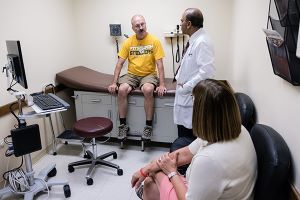
ALS/Neuromuscular Neurologist (MD, DO): The physician who provides an expert evaluation of an individual’s neurologic function, makes a diagnosis, and monitors the long-term course of the disease; also, the team leader who develops a plan of overall care management.
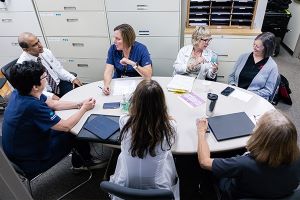
Clinical Coordinator: The coordinator generally acts as the primary point person for the ALS clinic. They may also serve in another role on the team (e.g., nurse, PT) and triages questions to the appropriate professionals, organizes the clinic schedule, facilitates flow of the clinic day, and coordinates follow-up appointments and orders to support continuity of the patient’s care.
Mental Health Professional: A licensed professional who has received specialized education in psychology, psychiatry, and/or counseling. Because living with ALS impacts a person’s mental well-being, including potential thinking and behavior changes, having a mental health professional available during the visit or as a consult is very important for understanding these changes and developing a care plan.
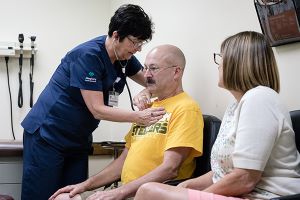
Nurse (LPN, RN, NP): A nursing professional may coordinate visits to the Center, arrange for appropriate specialty consultation, help run clinical research studies, and act as a resource person when patients have questions about their disease or care plan.
Occupational Therapist (OT): A licensed professional who evaluates difficulties conducting daily activities such as dressing, self-feeding, bed mobility etc. They also assist individuals in adapting to upper limb weakness and maintaining as much independent function as possible.
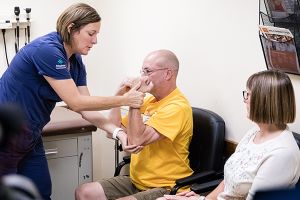
Physical Therapist (PT): A licensed professional who evaluates an individual’s muscle strength, walking ability, balance, and endurance. They recommend appropriate exercise programs, mobility aids, and orthotic devices to maximize safety, function, and independence.
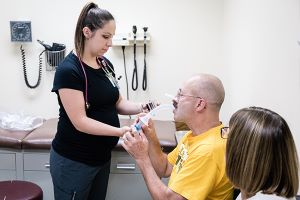
Pulmonologist (MD, DO): A physician who evaluates and monitors respiratory function, treats pulmonary infections and breathing difficulties, and advises people living with ALS regarding major decisions about long-term respiratory and nutritional support. The pulmonologist may be at the ALS clinic or may serve on a consultation basis if a respiratory therapist is part of the clinic team.
Registered Dietitian (RD): A trained professional who evaluates an individual’s weight and nutritional status and eating and swallowing difficulties. The dietitian provides recommendations for fluid and caloric intake, dietary modifications, and nutritional supplements as appropriate.
Respiratory Therapist (RT): A licensed professional who evaluates an individual’s breathing by measuring the strength of respiratory muscles, educates patients and families regarding the effect of ALS on the respiratory system, and recommends options for airway clearance, noninvasive and invasive ventilation. In some clinics, a pulmonologist may work collaboratively with the respiratory therapist or may manage aspects of respiratory care, including testing, education, and treatment.
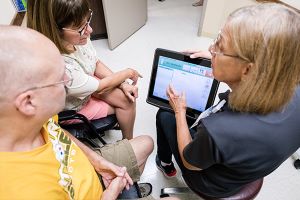
Speech-Language Pathologist (SLP): A licensed professional who assesses an individual’s speech and swallowing difficulties and provides strategies to overcome these problems. They recommend supplemental or alternative methods of communication, ranging from rapid access to hi-tech as appropriate.
Social Worker (SW, LCSW): A licensed professional who helps patients and their families utilize appropriate community resources for their health care needs, discusses health care benefits and concerns related to work and financial matters and may also provide psychosocial support. In some clinics, they may also serve in the role of mental health professional and will work with the neurologist to address psychological needs of the person with ALS and their family. Some situations may require a referral to a psychotherapist, psychologist, or psychiatrist for more intense therapy or follow-up.
The ALS Association Care Services Liaison: The local care team liaison, typically the Care Services Coordinator or Director, helps people living with ALS and their families cope with the day-to-day challenges of living with ALS by providing information, resources, and referrals to specialty and community organizations. This individual is a key member of the multidisciplinary team and a direct conduit to ALS Association programs and services.
The physical, emotional, social, spiritual, and financial challenges often associated with an ALS journey can often become overwhelming, so clear communication among the care team and coordination of care and services becomes vital. The multidisciplinary team can help facilitate shared decision-making and the continuum of care, helping patients to do what they can to live their life the way they choose, despite having ALS.
To learn more about ALS multidisciplinary care or contact your local care team, visit our website HERE. To find an ALS Certified Treatment Centers of Excellence, Recognized Treatment Centers or ALS affiliated clinic, use our clinic locator map HERE.
To continue to follow stories about people living with ALS in the community and learn more about the disease, subscribe to receive our weekly blogs in your inbox HERE or follow us at als.org/blog.
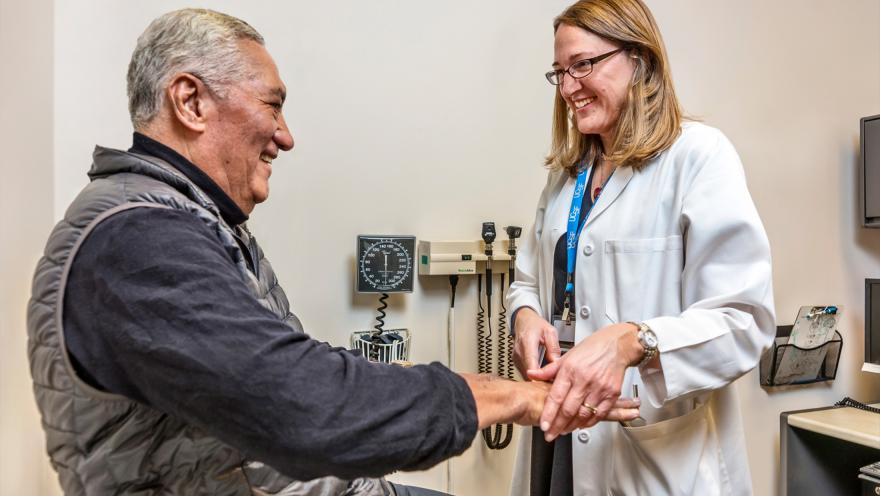

Join the conversation. Please comment below.